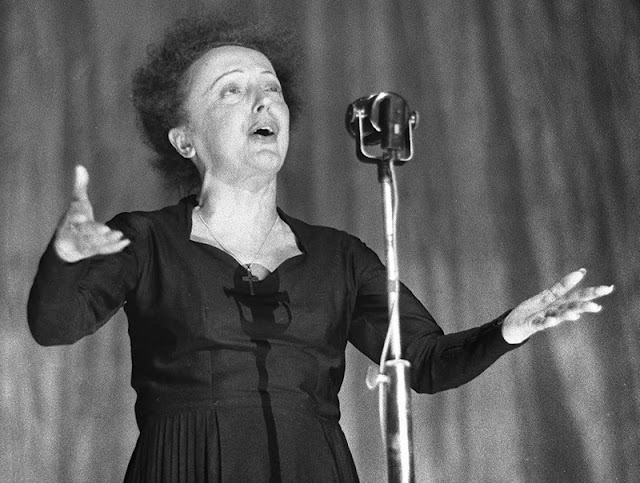
Woman's Hour: Edith Piaf
"When Edith Piaf died in 1963, two million people came onto the streets of Paris to mourn her. In the 1940s and 50s, her name became synonymous with intense songs of love and death. Piaf’s life was as eventful as her songs – her early years were spent in her grandmother’s brothel, her first mentor was murdered, and the love of her life died tragically in a plane crash."
The Reunion: National Theatre
"Sue MacGregor presents the series which reunites a group of people intimately involved in a moment of modern history. She brings together some of the original members of the National Theatre to remember its birth in 1963 under artistic director Laurence Olivier. Her guests are Sir Michael Gambon, Sir Derek Jacobi, Dame Maggie Smith, Dame Joan Plowright and Bill Gaskill."
Night Waves: Landmarks: Oh What a Lovely War
"It's fifty years now since Oh What a Lovely War was first performed and this evening Night Waves pays tribute to Joan Littlewood's revolutionary anti-war musical. In a programme recorded before an audience at the Theatre Royal Stratford East where the show received its premiere, Samira Ahmed and her guests, the critic, Michael Billington, Erica Whyman from the RSC, the historian, David Kynaston and Murray Melvin from the original cast, discuss how Oh What A Lovely War changed Britain's theatrical landscape and redefined the way the think about the First World War."
Document: Guyana
"Mike Thomson investigates how Britain covertly manipulated the democratic process in its South American colony, then known as British Guiana in the run up to its independence in 1966. Mike discovers new documents which show that they deliberately scuppered the outcome of their own conference organised to determine the country's future. [...] On the face of it the conference, held in London in October 1963, was designed to confirm the constitutional future for what was then British Guiana. Publicly Britain encouraged the country's Prime Minister Dr Cheddi Jagan - who had been fairly elected in 1961 - and the leader of the opposition Linden Forbes Burnham to agree terms for independence. However, behind the scenes, the documents reveal that the British were working to a different outcome - to ensure that agreement was never reached."
The Prime Ministers: Harold Macmillan
"Nick Robinson, the BBC Political Editor, continues his series exploring how different prime ministers have used their power, have responded to the great challenges of their time and have made the job what it is today. The sixth of Nick's portraits in power is Harold Macmillan, prime minister between 1957 and 1963. "
Monitor: Prince of Denmark
"Huw Wheldon bravely referees this clash of the titans as Peter O'Toole, Orson Welles and veteran thespian Ernest Milton compete to present the definitive analysis of 'Hamlet'. The atmosphere and some of the language used reflect this progamme's original late-night timeslot. This programme is incomplete and has some audio drop-out."
BBC News: An Interview with The Beatles
"The Beatles prepare for their appearance on 'The Royal Variety Performance' as Peter Woods asks them about their expectations for the future."
90 by 90: The Beatles talk posh
"Jolly joshing between the Beatles and a BBC reporter."
Dateline: The Beatles
"The Fab Four are interviewed while at the Gaumont Theatre, Doncaster. To the accompanying background noise of screaming fans, Dibbs Mather talks to each of The Beatles individually and elicits their ideas about future career prospects when their current musical popularity wanes. These plans vary from being a ladies' hairdresser to having 'a little business', although Lennon's answers are less straightforward. "
South Today: Winter of 1963
"Alexis Green investigates the severe winter of 1963"
BBC Magazine: The BBC's first Man in Moscow
"The BBC tried to open a bureau in Russia during World War II but only succeeded some 20 years later - in 1963. Erik de Mauny was the obvious choice for the BBC's first resident correspondent in the USSR. Not only did he have plenty of foreign reporting experience he also had a university degree in Russian. De Mauny's son Marc still lives in Russia, where he is general manager and executive producer of Perm Opera and Ballet Theatre, one of the country's oldest and most successful musical theatres. Marc de Mauny spoke to the BBC's current man in Moscow, Steve Rosenberg, about his memories of his father's time there."
BBC News: Good Morning Wales marks its 50th year of broadcasting
"This weekend marks 50 years since the first edition of Good Morning Wales on BBC Radio Wales. The breakfast programme has been on the air, in one form or another, since 1963. BBC Wales arts and media correspondent Huw Thomas has trawled through the archives and spoken to some of the people who have helped to keep Good Morning Wales on the air for all these years."
Sir Alec Douglas-Home's first address as PM
"Sir Alec Douglas-Home makes an address from 10 Downing Street after becoming prime minister in October 1963."
Face to Face: Dr Martin Luther King Jnr
"First transmitted in 1961, Dr Martin King Jnr talks about his childhood experiences and the incidents that led to the Montgomery bus boycott. These events shaped King's life and led to him becoming a national figurehead and civil rights leader."

No comments:
Post a Comment